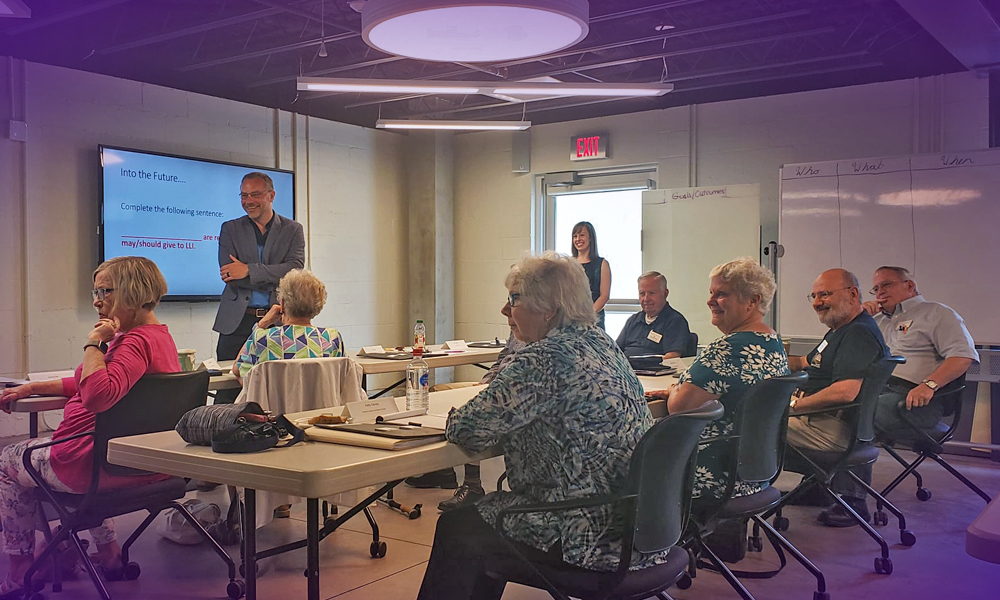Opening the door to learning
Education
SUMMARY: The School of Professional and Continuing Education offers flexible programs for nontraditional students with a wide range of opportunities to further their education.
For many people, autumn carries memories of back-to-school time, even long after they left the classroom behind. If the start of fall finds you yearning to learn, JMU’s School of Professional and Continuing Education holds the key.
SPCE features programs designed for the nontraditional student, from a one-off class or training session to a four-year degree. These programs fit the school’s vision of learning across the lifespan. SPCE offers the Adult Degree Program, a degree completion program for working adults; certificate programs for professionals looking to enhance their credentials; the Lifelong Learning Institute, which is catered to retired individuals; youth programs, including summer camps; and professional development leadership programs.
|
“People may want to upscale in a particular area, go up for a promotion, or pursue a different kind of career entirely.” — Sarah MacDonald, associate dean of School of Professional and Continuing Education |
A “nontraditional” student is typically 25 or older, may have a full-time job, often has caretaking responsibilities and does not live on campus, according to Sarah MacDonald, associate dean of SPCE.
“People may want to upscale in a particular area, go up for a promotion, or pursue a different kind of career entirely,” MacDonald said.
The programs offered within SPCE have seen significant growth in recent years. Nick Swartz, dean of SPCE and once a nontraditional student himself, said the school’s leadership team is intentional about that growth. “We set a target,” he said. For example, SPCE recently reached its goal of increasing enrollment from 200 to 500 students in the Adult Degree Program in just five years.
Additionally, Swartz said, there is a new trend emerging in higher education that involves a slightly older demographic. “A lot of individuals are wanting to go back to college and complete their degrees, and this trend is true in other parts of our portfolios,” he said.

Adult Degree Program
The Adult Degree Program is a fully online, undergraduate degree completion program that is personalized and interdisciplinary to meet the specific needs of each student.
Daniel Robinson, director and academic unit head of ADP, acknowledges that 18 may not be the right age for everyone to start their college experience.
“For many, the challenges of life, family, finances or health can get in the way. For some, they weren’t as developmentally prepared to be successful fresh out of high school. Whatever the reason, we want to be a pathway for learners to fulfill that goal and take full advantage of their education,” Robinson said.
The program’s target demographic has some college credits, but no degree. ADP is mindful of this group’s primary concerns. “Our first priority is clarity and transparency with our students about what they can expect in the program, how much time it may take in their case and the costs associated,” Robinson said.
To help bridge the gap between course work and the experience students may have gained in their adult careers, ADP is expanding credit opportunities.

“There are lots of opportunities within the Adult Degree Program for adult learners to earn credit for work that they completed outside of college classrooms, whether through training programs they have done at work or community involvement,” MacDonald said. “We call that credit from prior learning.”
The nontraditional student faces a different set of circumstances than the traditional student who is 18 to 22 years old, Swartz said. “They need a bit more attention, and so we provide that through our academic advisors.” These academic advisors are fully dedicated to their students, he said.
|
“Our first priority is clarity and transparency with our students about what they can expect in the program, how much time it may take in their case and the costs associated.” — Daniel Robinson, director and academic unit head of Adult Degree Program |
A flexible curriculum is another crucial aspect of nontraditional students’ success, along with a supportive environment.
“Students, even though they are undergraduate degree-seeking students, can take a semester off without needing special permission from the registrar’s office,” said MacDonald. “Things come up in an adult learner’s life, and they may need to step away for a while.”
The goal is to make returning to school as easy as possible. “High-quality education enables individuals to fully and actively participate in the workforce and economics, as well as cultural and civic life,” Robinson said. “We want our program to remove barriers and limitations our learners may have experienced.”
For some, the experience is made more special by sharing it with family members, like the mother-son duo who graduated in the spring on the same day — one through SPCE and the other in the College of Business.
SPCE recognizes the value in complementing nontraditional students’ learning with social experiences. “We really do think about other ways that we can provide these [social] opportunities for our students,” Swartz said.
SPCE has successfully implemented InScribe, which gives students access to a community platform. “It allows our students to have a deeper, more meaningful connection with other students,” Swartz said.
The value of SPCE
Many factors contribute to making SPCE a worthwhile investment for students’ personal and professional growth. For many, COVID-19 and the ensuing lockdown inspired their return to school.
“Our Lifelong Learning Institute, which is entirely self-enrichment programs for senior citizens — all of them non-credit — is seeing incredible growth coming out of the pandemic, where people felt really isolated and wanting to come together to have that kind of connection again,” MacDonald said. “All of SPCE’s programs are designed to help build community and meet the needs of our community and region, both in terms of preparing the workforce and in providing access to the resources of higher education at JMU,” said Swartz.

For those who may be hesitant to go back to school, MacDonald offers some reassurance. “The most compelling thing we hear from students over and over again is it often feels like it is just going to take too much time,” she said.
Someone starting a degree at age 48 may not see the point of spending five years on a program they won’t finish until they’re 53, MacDonald said. But time will pass regardless. “It’s up to you to put in the work to make that time meaningful.”
|
“My advice to any of our students would be, ‘Yeah, it is an absolute sacrifice, but you can do it, and at the end it will absolutely be worth it.” — Nick Swartz, dean of SPCE |
Once nontraditional students register for classes, the SPCE team aims to help them develop coping strategies for tough times, such as dealing with sick children, bad days at work or late nights. ADP helps them harness that energy as motivation.
“Finding the strategies and coping mechanisms to dig deep and stay at it, to keep going, are necessary to success,” MacDonald said.
To Swartz, the process is about continuous development, growth and empowerment.
“I don’t think we ever stop learning, and if we can provide opportunities for individuals through our programming and through our relationships and expertise, that is a pretty special thing for us to provide and a pretty powerful thing for us to be a part of,” he said.
“My advice to any of our students would be, ‘Yeah, it is an absolute sacrifice, but you can do it, and at the end it will absolutely be worth it.’”
